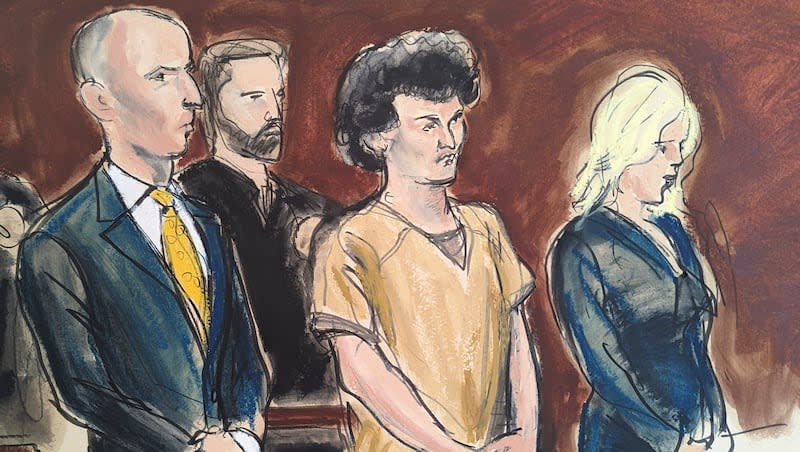Federal judge sentences crypto fraudster Sam Bankman-Fried to 25 years in prison

- Oops!Something went wrong.Please try again later.
Convicted cryptocurrency fraudster Sam Bankman-Fried was sentenced to 25 years in prison by a federal court judge on Thursday in a ruling that fell short of the 40 to 50 years prosecutors were seeking but far exceeded the five to six years sought by Bankman-Fried’s defense attorneys.
Bankman-Fried was convicted last November on two counts of wire fraud conspiracy, two counts of wire fraud and one count of conspiracy to commit money laundering, each of which carries a maximum sentence of 20 years in prison. He was also convicted of conspiracy to commit commodities fraud and conspiracy to commit securities fraud, each of which carries a maximum sentence of five years in prison.
Before his downfall, Bankman-Fried rode his business success as founder of cryptocurrency exchange FTX into the media spotlight with a lavish lifestyle, celebrity endorsements, a pricey Super Bowl ad and big-ticket donations.
FTX was launched in 2019 and benefitted from a wave of interest and investment in digital currencies that drove his company to a valuation that peaked at around $32 billion in early 2022. But later that year, it was revealed that Bankman-Fried and other members of his leadership team coordinated fraudulent use of customer funds to prop up a failing hedge fund, Alameda Capital, run by Bankman-Fried’s former girlfriend and business associate, Caroline Ellison. The rapid unraveling of Bankman-Fried’s business interests in November 2022 followed a steep decline in cryptocurrency values and a damning article by CoinDesk that revealed the connections between FTX and Alameda. A leaked balance sheet also showed FTX was in serious financial distress and overextended by billions.
Bankman-Fried was arrested in December 2022 and indicted on eight criminal charges; he was released on $250 million bail but was later taken back into custody for having inappropriate contact with potential witnesses in the case.
Prosecutors were seeking a sentence of 40 to 50 years after Bankman-Fried was convicted last November.
During the Thursday hearing, prosecutor Nicolas Roos said criminality ran throughout Bankman-Fried’s business operations.
“Sam Bankman-Fried stole over $8 billion in customer money, and I emphasize stole because it was not a liquidity crisis, or an active mismanagement, or poor oversight from the top,” Roos said. “It was not a bloodless financial loss on paper.”
U.S. District Judge Lewis A. Kaplan said, per The Associated Press, the sentence reflected “that there is a risk that this man will be in position to do something very bad in the future. And it’s not a trivial risk at all.” He added that it was “for the purpose of disabling him to the extent that can appropriately be done for a significant period of time.”
In a court filing ahead of Thursday’s hearing, prosecutors outlined the extent to which Bankman-Fried’s fraudulent activities impacted the customers and clients of both FTX and Alameda Capital.
“The defendant victimized tens of thousands of people and companies, across several continents, over a period of multiple years,” the filing reads. “He stole money from customers who entrusted it to him; he lied to investors; he sent fabricated documents to lenders; he pumped millions of dollars in illegal donations into our political system; and he bribed foreign officials. Each of these crimes is worthy of a lengthy sentence.”
During Thursday’s proceeding, defense lawyer Marc Mukasey said his client was misunderstood and asked for leniency.
“Sam was not a ruthless financial serial killer who set out every morning to hurt people,” Mukasey said. “Sam Bankman-Fried doesn’t make decisions with malice in his heart. He makes decisions with math in his head.”
Ellison and two other close associates of Bankman-Fried pleaded guilty in earlier cases to related crimes and testified at his trial.
“Ellison described Bankman-Fried as a calculating individual who knew that he was likely committing crimes when he directed the use of customer funds. Two other onetime friends of Bankman-Fried, Gary Wang and Nishad Singh, also testified they felt they were directed by Bankman-Fried to commit fraud,” per AP.

